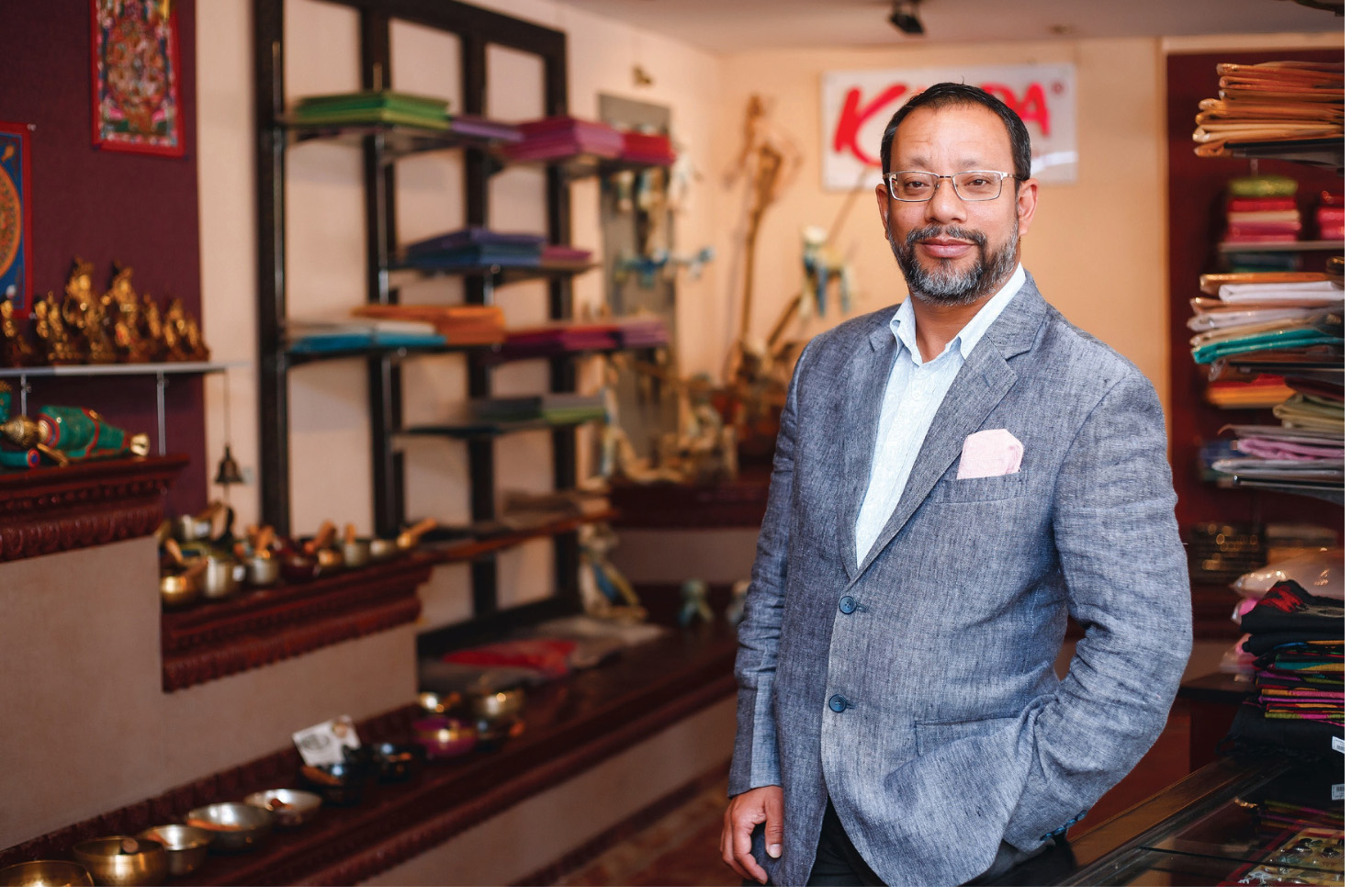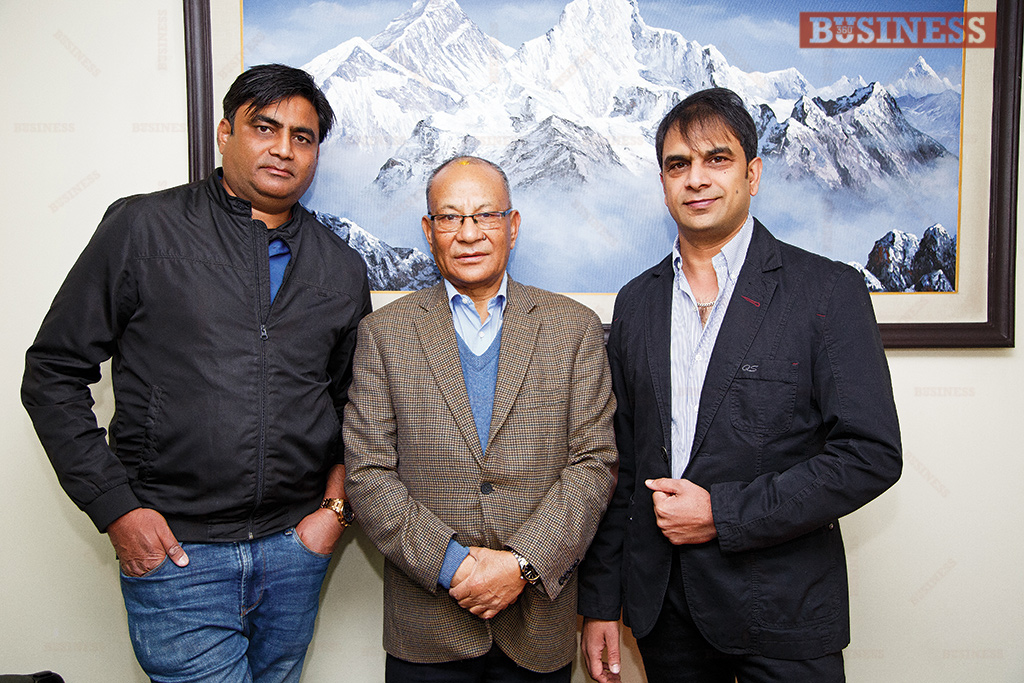
Text by Sajeet M. Rajbhandari.
Dr. Sunil Chitrakar
CEO, Mahaguthi
Built around the core principles of fair trade and local sustainability, Mahaguthi has aged beautifully as a Nepali entrepreneurship. A non-profit that sought to disrupt the traditional trends that most businesses followed, Mahaguthi is a brand that paved way for kick-starters in Nepal today. Almost three decades of age, here’s the story behind how a small idea nurtured itself into a successful and sustainable non-profit business.
Bringing Mahaguthi to life
It started out all the way back in 1984 as a standalone project, Mahaguthi found life through the need to bring positive social change. “We started as a project made to empower women by selling the crafts made by them,” shares Dr. Sunil Chitrakar, the CEO of Mahaguthi. “We were also affiliated with Nepal Charkha Pracharak Gandhi Tulasi Smarak Mahaguthi.” It soon started to work with small artisans from all corners of Nepal. Chitrakar fondly recounts how the team travelled to various parts of the nation in order to work hand in hand with local communities. “We provided trainings and other capacity building support,” shares Chitrakar. Doing so allowed Mahaguthi to create a fully locally sourced product lineup that they sell both domestically as well as export to foreign shores.
Mahaguthi today is an accredited fair-trade company. What this means is that unlike companies that seek to maximise profit, Mahaguthi is a brand that seeks to ensure the economic and social well being of the people that contribute to it. It views its artisans and producers as partners who maintain a non-hierarchical status in the company, even if it means that the brand will pocket a little less chunk of the profit. For the Mahaguthi team, this is a small price to pay for the value of equity and integrity that they dearly believe in. After all they do live by their motto, “Craft With Conscience.”
Crafts & More
The Nepali handicrafts market wasn’t as diverse and saturated three decades ago in contrast to where it is now; and the number of NGOs and INGOs that worked in the cottage industry scene was even more minute. So, when Mahaguthi dived into rethinking how the crafts business in Nepal worked, it was truly a game changer. Back when Mahaguthi first came into being, most businesses were family based and their management was passed from one generation to the next. Chitrakar expresses that these business models were rather rudimentary in nature and lacked innovation and the ability to expand. With Mahaguthi, he sought to challenge the norm with a company that was “built by the people for the people” and was able to reach markets that had before been untouched. What’s more interesting is that rather than disregarding these pre-existing local businesses, Mahaguthi worked alongside them, learning from them and in turn educating these local institutions as well. In fact, Mahaguthi managed to turn them into a resource pool and exist in a sort of symbiosis with them.“We go around Nepal, trying to discover local skill and local resources and then turn them into lifestyle products. If you browse through our shop, you’ll see lifestyle products with traditional skills,” Chitrakar proudly shares, “What we do in turn is add value to these items through product design and marketing or through providing support to these artisans in design and training them in modern technologies.”
Besides working with more than 65 local artisan groups across the country, Mahaguthi also has its own production units that specialise in the production of home textile, garments, felt, handmade paper and such. Directly and indirectly creating job opportunities for more than 1100 people, Mahaguthi is also a pioneer when it comes to craft development. Chitrakar illustrates this by diving into how 20 years ago, art styles such as that of the Mithila community had hardly been commercialised by craft producers with the exception of Mahaguthi.
Value of Fair Trade
For Mahaguthi, fairness and equity have always had a pivotal position in how the company operates. The very fact that Mahaguthi was conceived as a non-profit organisation ensured that it would never overstep the boundaries of fair trade for economic gain. To the Mahaguthi team, this means to create sustainable products through local manpower all the while maintaining quality and safeguarding their economic responsibilities to their producers. Even the very name of the brand is meant as a representation of the Mahaguthi way of life. According to Chitrakar, “Mahaguthi is made up of two words, ‘Maha’ meaning big and ‘Guthi’ which translates to be cooperative. So, the brand literally means big cooperative.”
When asked how the scale between the value of a product and value for fair trade balances out, Chitrakar provides the following discourse, “Nepali products are often considered to be more expensive than their mass-produced counterparts. And there are so many ways to produce cheaper products, from choosing cheap raw materials, or allocating cheaper labor costs, or using environmentally unsustainable methods. However, while the end result may be cheap, but it will be so at someone else’s cost.” This way of manufacture doesn’t fit well within Mahaguthi’s school of thought. Mahaguthi as a matter of fact is a firm believer in creating equal opportunity for all of its employees, and goes as far as to include a fully functioning day-care center at its production centers for children of the 100% women employees. While domestic made crafts might carry a slightly heftier price tag at first glance, Mahaguthi believes that the little things such as the improvement in the quality of life of labourer’s are all worth going the extra mile for.
But how sustainable is a non-profit business model in Nepal? Well according to what Mahaguthi has witnessed and learnt during all its years in operation, there are a handful of key steps that a young startup or social enterprise should keep in mind. Reinvesting profits within the business itself proved to be a smart move for Mahaguthi and really helped the brand maintain a steady growth. Another major point is to target the right clientele; Chitrakar shared how a large part of all businesses are dependent on the loyal 20% of customers. Furthermore, learning how to avoid competition is also key when it comes to establishing the selling ability of a product. Mahaguthi invites competition and believes it to be a part of life; they manage to survive in such saturated market spaces by bringing out innovative design that is unique to them.
Moving With Time
A lot has changed during the three decades that Mahaguthi has been in existence. The way businesses function has been radically altered and the market space has been saturated to the brim. In order to stand its ground in the industry, Mahaguthi had to learn to adapt with the times as well. “In the past we never really invested much when it came to things like product designing and most of our designs would stick to its traditional roots,” recounts Chitrakar. He follows up by saying, “As we moved on, we learned the value of good design and stated to keep up with market tastes and preferences.” This adaptive nature that Mahaguthi adopted gradually helped them take strictly traditional crafts and integrate them into lifestyle products that fit into the Nepalese home as well as in foreign markets. Mahaguthi has in fact been constantly updating its product lineup bringing new product trends such as essential oils and ceramics to their shelves.
“In the 80s, any ethnic product could sell very easily and Nepalese products were very exotic for foreign buyers. But as the market grew, it also started to demand more from us and we had to become more design oriented,” shares Chitrakar. Times such as the Maoist insurgency proved to be especially difficult for a brand that relied on people from all over the country to sustain its business, but in the end Mahaguthi was able to pull through and its values stuck with it through thick and thin. In present day, the Mahaguthi brand sees itself expand its business and business model across the globe. While the brand does export to places such as Japan and Europe, a stronger global presence would be beneficial not just for the brand but for the Nepali economy as well. “We also want to expand our ideas. Fair trade is based on dialogue, transparency, and respect,” says Chitrakar who considers it their success. Mahaguthi is also open to franchising the brand both domestically and internationally, with a strong intention of expanding to regions such as Pokhara and Lumbini.





